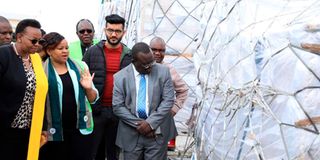Facts about the upcoming General Election

IEBC commissioners led by Vice chairperson Juliana Cherera (second left) lead political parties representatives in receiving the presidential ballot pallets at JKIA on July 27, 2022. Jeff Angote | Nation
What you need to know:
- There are 46,233 polling stations, up from 40,833 in 2017.
- More than half a million people will run the election.
- Over Sh44 billion will be spent on the election.
- There are more than 16,000 candidates
The Daily Nation Explainer Desk breaks down all the interesting facts you need to know about the August 9 General Election.
There are 46,233 polling stations, up from 40,833 in 2017. This is due to an increase in the number of registered voters from 19,611,423 to 22,120,458. This gives additional over 6,000 new polling stations.
The law stipulates that no polling station should have more than 700 voters.
Nairobi, which has 2,415,310 voters, got 960 additional stations, increasing its total to 4,338 from 3,378 in 2017.
The former Rift Valley province, which has 2,670,969 registered voters, got 949 additional stations, the second highest number.
Also read: Saga of seized polls materials exposes George Kinoti, Wafula Chebukati
The Mt Kenya region, with 10 counties, has 894 new stations.
In Nyanza, the six counties with 3,120,732 voters got 802 additional stations.
In Ukambani, there are 355 additional stations, with 1,699,724 registered voters in the three counties of Machakos, Makueni and Kitui.
The five North Eastern counties now have 591 additional stations, while the Coast region has 517 stations more.
Personnel
More than half a million people will run the election.
The Independent Electoral and Boundaries Commission (IEBC) will deploy more than 500,000 personnel to run the elections.
These include 323,603 polling clerks, 92,458 presiding officers and deputies, 94 county returning officers and deputies, 580 constituency returning officers and deputies, 290 ICT clerks, 290 logistics officers, and 5,827 support electoral trainers.
Money to be spent
The IEBC has been allocated slightly over Sh44 billion to cover the costs of running this year's elections.
The agency had been awarded Sh22.9 billion in the 2021/2022 financial year but a further Sh21 billion was allocated in May.
While still staggeringly expensive compared with similar jurisdictions around the world, allocations to this year’s elections are marginally lower than the Sh49.8 billion spent in the 2017 General Election, while still covering the cost of a possible rerun.
The 2017 allocation, the highest in the country’s history, did not include the cost of the October 26 fresh presidential election ordered by the Supreme Court after justices nullified the outcome of the earlier election. In the rerun, the IEBC spent Sh10.3 billion.
Number of candidates
This election has attracted 16,098 candidates – with four vying for the presidency.
Among the candidates are 2,132 eyeing 290 parliamentary slots, 340 for the Senate and 266 for governor seats.
Another 12,994 candidates are vying for 1,450 ward representative positions.
This election has also attracted three female Deputy President candidates for the first time.
Unopposed candidates
There are three unopposed candidates who have been declared duly elected by the IEBC.
Beatrice Kemei, Julius Kimutai and Issa Aden did not have any competition in the seats they were running for and the IEBC, in a Gazette Notice, proclaimed them legitimately elected in the August polls.
Ms Kimei (UDA) is the Kericho Woman Representative, Mr Kimutai is the MCA for Ravine ward in Eldama Ravine constituency, while Mr Aden is the Sabena MCA in Garissa's Lagdera constituency under the National Agenda Party.





